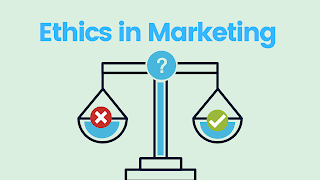Ethical Issues In Marketing
In the current era of heightened consumer awareness, business owners must understand one empirical fact: buyers prefer to invest in ethical brands.
Ethical Issues in Marketing
For this reason, you should consider the impact of your marketing strategies from an ethical point of view, especially given the heightened sense of social awareness among younger audiences. To illustrate what these potential issues are, we've looked more closely at the importance of ethics, what to avoid in your campaigns, and how you can adopt moral principles to your long-standing advantage.
1. False Advertising
You should be careful to avoid overstating the benefits that a product or service offers in your marketing and advertising communications, so as to steer clear of accusations of false advertising. Advertising is considered to be misleading if it misrepresents the value, uses, or outcomes of a product, utilising inaccurate information in its content to gain buyers' interest.
Although false advertising may be successful in drawing customers into the early stages of a sales funnel, it ultimately proves extremely harmful to consumer trust and influences long-term negative brand perception when shoppers inevitably feel disappointed and deceived.
2. Selective Marketing
The practice of customer segmentation can become immoral if it results in selective marketing, a term that describes the exclusion of particular types of consumers, most commonly determined by their sexual orientation, ethnicity, weight, or physical mobility.
This selective marketing discourages demand among so-called 'undesirable' consumers who are considered to be unprofitable or damaging to the brand's image, by making them feel unwanted and unwelcome, whether through lack of inclusion in marketing campaign representation, restricted customer targeting, or deliberate limitations of product ranges.
3. Unethical Data Collection
Market research is incredibly valuable for businesses throughout all stages of their operations; utilising accurate consumer data in the composition and execution of market strategies can greatly boost the effectiveness and ROI of promotional activities. Data collection must be conducted ethically, however.
You should carefully consider governmental data and privacy protection policies before embarking on market research activities, and ensure full compliance with these regulations. In Europe, businesses must refer to General Data Protection Regulation (GDPR), while companies registered in the US can utilise the nation's own privacy protection laws.




Comments
Post a Comment